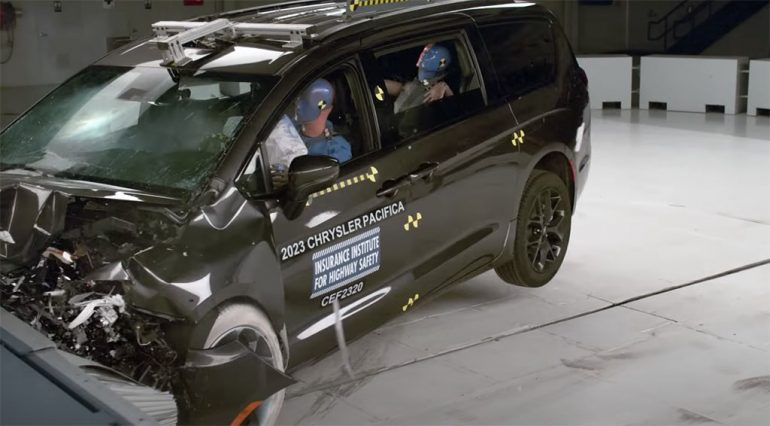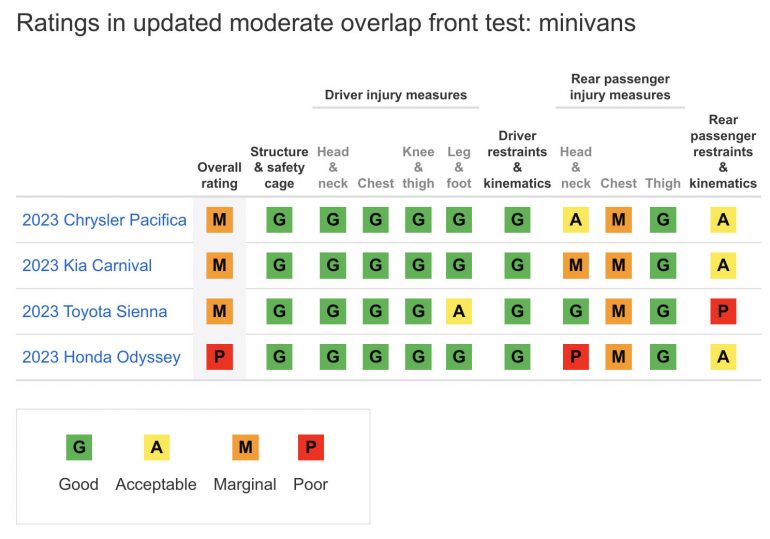
The recent crash tests conducted by the Insurance Institute for Highway Safety (IIHS) have raised concerns about the safety of several popular minivan models: the Chrysler Pacifica, Honda Odyssey, Kia Carnival, and Toyota Sienna. The IIHS, known for its rigorous testing procedures, used its more challenging moderate overlap front crash test to evaluate the performance of these vehicles, and the results were far from reassuring.
In the IIHS rating system, vehicles are categorized as Good, Acceptable, Marginal, or Poor, with Good and Acceptable indicating a higher level of safety. Surprisingly, none of the new minivans managed to receive a Good or Acceptable rating in this test.
Also, don’t forget that you can get discounted new car pricing with a free quote through qualified local dealer partners.
One significant change in this updated moderate overlap front crash test is the evaluation of second-row passenger safety. While all of the tested minivan models performed well in protecting the driver, the concern arose when it came to safeguarding the occupants in the back seat. The IIHS uses a crash dummy in the second row, simulating a small woman or a 12-year-old child.
IIHS President David Harkey emphasized the importance of back seat safety, particularly for vehicles like minivans that families choose for transporting their loved ones. Unfortunately, all four minivans tested left second-row occupants vulnerable to chest injuries. The primary culprit was identified as “excessive belt forces or poor belt positioning.”

The Toyota Sienna was the only minivan among the four to feature belt pretensioners and force limiters. However, even in this case, the backseat dummy slid beneath the lap belt, and the shoulder belt moved dangerously close to the neck, highlighting the complexity of the issue.
The Chrysler Pacifica faced its own safety problem as the side curtain airbag failed to deploy during the test, potentially compromising occupant safety in side-impact collisions.
The Kia Carnival’s performance was marred by higher forces on the dummy’s neck compared to the Pacifica and Sienna. This elevated the risk of head or neck injuries, according to the IIHS findings.
The Honda Odyssey, unfortunately, showed the worst results among the tested minivans, with sensors on the second-row dummy registering even higher forces on the head and neck than the Carnival. There was also a risk of the head striking the front seatback in this scenario, further emphasizing the safety concerns.
It’s worth noting that the IIHS has been conducting these challenging moderate overlap front crash tests throughout the year on various vehicle groups, and very few models have managed to earn the coveted Good rating. Some of the exceptions include the Honda Accord, Ford Explorer, Ford Mustang Mach-E, Subaru Ascent, and Tesla Model Y, indicating that these vehicles offer a higher level of occupant protection in these demanding crash scenarios.
In light of these findings, consumers and manufacturers alike are reminded of the paramount importance of vehicle safety, particularly when it comes to protecting all occupants, including those in the back seat, in various crash scenarios.
